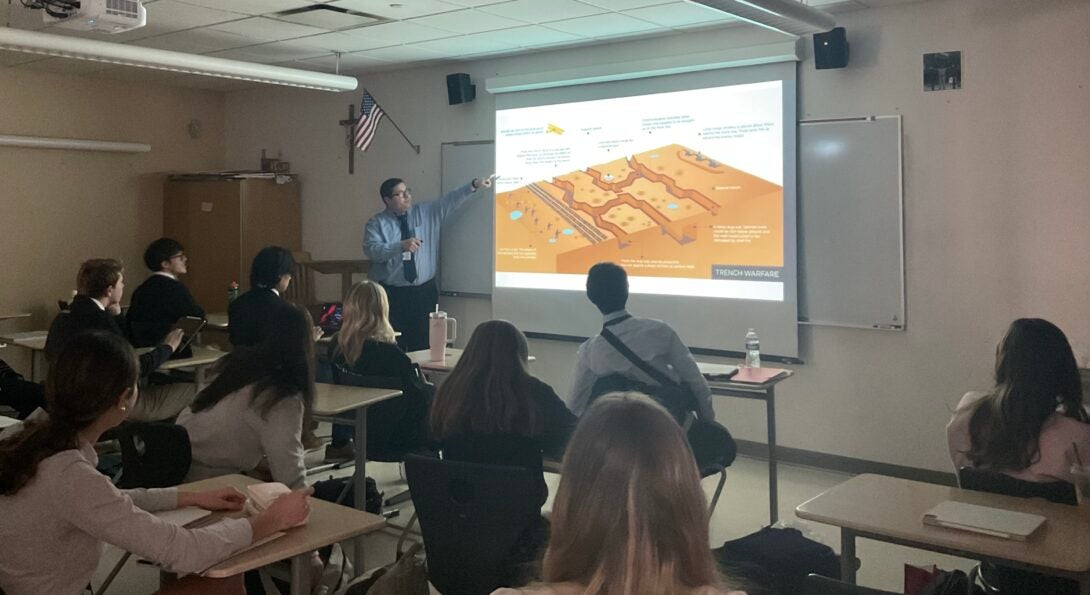Q&A with a History Alum: Victor Leal-Painter

Leal-Painter (Teaching of History '24) takes his UIC History degree to the classroom and beyond.
During his time at UIC, History alumnus Victor Leal-Painter (Teaching of History '24) had an excellent run. He was a recipient of the prestigious Davee Scholarship for upcoming History majors and served as the Vice President of the History Club. He now teaches history and civics at Fenwick High School, a college preparatory school in Oak Park, IL. Leal-Painter was kind enough to tell us all about his experiences in History at UIC, how the program and coursework informs his work today, and his plans for the future.
How was your experience at UIC?
My experience at UIC was great. I am very happy with the education I received and I made a lot
of great friends along the way. There is such a welcoming and collegial atmosphere to the
department that I didn’t feel anywhere else on campus. That atmosphere is something we
wanted to replicate when starting the history club again. Looking back, I consider my
involvement in that process to be the best thing I did at UIC. Although I can no longer attend
meetings, it’s still such a joy to receive the weekly emails from the club and its new generation
of leaders who are carrying on what we started over three years ago. Kudos to the President,
she’s done a remarkable job and I couldn’t be prouder.
What skills did you learn in History that have helped you after you graduated?
I think one of the most important skills that any History student learns is critical thinking and
interpretation. This is especially helpful for me as a teacher because I’m able to teach my
students how to question and interpret primary and secondary sources so they can understand
that there are multiple viewpoints in the historical record. Another great set of skills you learn is
adaptability and problem solving. Being a teacher, you have to think on your feet to make
adjustments so when things go wrong, you know how to improve them.
How long did it take you to get a job after graduation?
It was a very quick transition from graduation to getting a job, about a week. Commencement
was on a Friday, and I found the job on Saturday. I applied on Sunday, and they immediately
reached out on Monday. There were two rounds of interviews on Tuesday and Thursday, and I
was hired on Friday. I could never have anticipated that kind of turnaround, but I was very
blessed to find a position so quickly and at such a great school like Fenwick.
What are your long-term plans?
I’d like to get my master's degree in educational administration and get a principal endorsement
on my educator license. I’m very passionate about the teacher preparation process and
advocating for new teachers coming into the field. Having gone through the process at the
college level and continuing as a first-year teacher, there are some areas that could be
improved across the board. After a few years in the classroom, I see myself transitioning to a
mentor or admin role or even jumping into higher ed working directly in teacher preparation as a
program director and/or instructor.
What would you tell current UIC students?
Embrace challenges and remain curious. College is a time for self-discovery, growth, and
learning. Balance hard work with self-care, and don’t hesitate to ask for help when necessary.
Build relationships, take risks, and remember that success isn’t solely about grades—it’s about
developing skills, resilience, and the ability to adapt. Above all, enjoy the journey and make the
most of every opportunity that comes your way!
What was your favorite class?
It’s very hard to pick just one class. I would say the ones I’m finding more useful in my new
position right now, besides the education and teaching classes, are HIST 408: Athenian
Democracy with Prof. Young Kim and HIST 103: Early America with Prof. Bao Bui. There are
concepts that I learned in these two classes that I’m applying to the classes I’m teaching now,
namely Civics and US History.
Prof Kim made it a point to get us to see the connection between the development of
democracy Athens to the development of modern systems of government. Being able to impart
that connection between ancient and more modern history to my students has deepened their
understanding of the US government as a whole.
With Prof Bui, he made the contradictions between the actions of American leaders and the
American values that the collective heart of the country holds so near and dear very apparent.
In the context of my teaching, it adds a level of complexity to the American story that my
students find very interesting and keeps them engaged in the material.
What was your favorite research paper?
My favorite research paper I did was for HIST 300. I wrote it on the emergence of Black
Catholicism in Chicago during the 1960s. Following the Vatican II reforms, Black priests all over
the country began to innovate Catholic practices to make them more inclusive to the Black
community. Chicago was no exception to these innovations, much to the displeasure of
Archdiocesan leadership and many white Catholics. I focused on the emergence of this new
identity from the perspective of Black Catholics, white Catholics, and Church leadership in
Chicago. The main question I raised in the paper was whether or not the Catholic Church, which
prides itself on being the one, true, universal Church, is really universal at all. A devout Catholic
might insist that it is but history and its effects tell a different story.
This was the first research paper I completed and it got me really interested in contemporary
religious history and Catholic studies. If I ever went back to do grad work in history, I would
definitely focus my research on these two fields